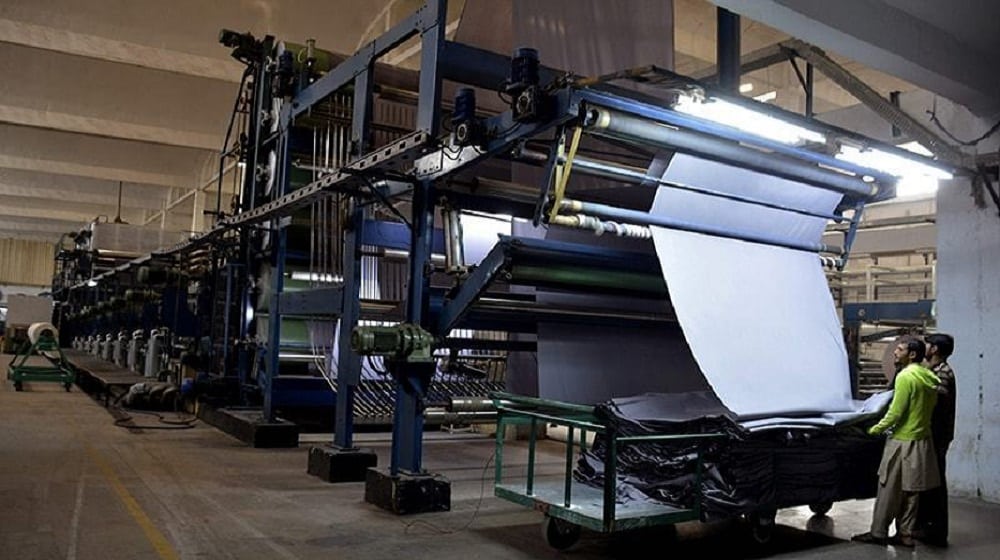The country’s textile exports are expected to decline below $1 billion per month from January 2023 due to issues including supply chain disruptions, liquidity blockades, and rising energy expenses.
According to the All Pakistan Textile Mills Association (APTMA), Pakistan largely depends on textile exports for foreign currency and employment. The international economic situation primarily caused by the Ukraine crisis and the floods in Pakistan have combined to formulate the perfect storm for the economy.
Under these circumstances, the industry requested the Prime Minister’s attention to the issues being faced by the industry to enable the export-oriented sector to continue contributing to the economy.
The textile sector is now operating at a capacity utilization of less than 50 percent across the country. A substantial number of jobs have already been lost and many more are to follow if remedial measures are not urgently undertaken. This is because of the following five issues:
1) Supply Chain Disruptions
- Flood destroyed cotton crop- only 5 million bales this year while industry requires 14 Million Bales.
- Forex issues have curtailed the import of cotton and other essential inputs for exports.
- Increased the cost by 20 percent due to demurrage /detention and delays.
- Loss of any failure to book orders due to uncertain and delayed turnaround time for export orders.
The association recommends the following:
- Clear all imports of Export Oriented sectors that have arrived at parts whether against L/Cs or cash against documents.
- Priority for and exempting Export Oriented sectors from import controls allowing L/Cs for raw material machinery, spare parts, and other items to restore the industry’s supply line.
- Refund all Demurrage and Detention Charges incurred by EOU Sector to maintain competitive costs for exports.
- Maintain a 24-hour help desk to monitor and resolve exporters’ issues.
2) Working Capital/Liquidity Constraints
- Currency depreciation of 60 percent in the last year with no corresponding increase in working capital facilities.
- A much higher quantum of funds is stuck in work in progress as a consequence of a 17 percent sales tax and devaluation on all inputs.
- Abandonment of the FASTER system commitment to pay refunds within 72 hours.
- Foreign buyers extend their payment period against shipments.
- Accumulation of “Deferred Sales Tax” which has not been refunded for the last 3 years
APTMA recommends to:
- Restore SRO 1125, Zero rating for the textile value chain while collecting sales tax on domestic sales at the point of sale.
- Immediately refund all deferred Sales Tax, Tuff, and other dues.
- Extension in submission date of Duty Drawback claims for FY21.
- A new Export Sector working capital lending facility be established catering to EOU sectors at subsidized rates to tide over the current crisis.
3) Moratorium on Debt
- As a consequence of Supply Chain Disruptions which have severely curtailed production/operations and therefore cash flow.
- Liquidity Crisis due to 60 percent devaluation, Sales Tax, and other pending refunds.
- Non Functioning of new projects and expansions.
The association said the export-oriented units will be under immense pressure as they cannot generate funds to service debt. This will lead to massive defaults further curtailment of capacity and a possible banking crisis. In this regard, it recommends a moratorium on capital repayment from July 1st, 2022, to June 30, 2023.
4) Energy
- Gas/RLNG
Gas/RLNG being supplied to Punjab is priced at $9 of the average consumption of mills last year. This formula irrationally excludes the new plants/expansion that has been made during the last 2 years. Gas/RLNG supply to the Sindh export industry is supplied at $3.75/MMBTU (Rs. 840) and at a quantity meeting 80 percent plus requirements.
This is contrary to the commitment that the differential in gas/RLNG pricing within the country will be less than $2 to keep the Punjab industry competitive. This huge differential means that Punjab-based industry is paying for gas at $9 and electricity at Rs. 19.99/kWh while the bulk of the Sindh industry is generating their own electricity at 4 cents/kWh.
Given this differential, Punjab-based industries are no longer viable and have no option but to close down as they are no longer competitive and available orders are shifting or in process of shifting to cheaper alternatives internationally and within Pakistan.
New connections for RLNG/Gas are not being extended to the competitive tariffs from July 1 percent, 2022.
The APTMA recommends the implementation of Weighted Average Cost of Gas while extending RCET across the country to enable new industrial units, expansions, and Punjab-based industries to compete; accord first priority to export industry on Gas/RLNG supply; and allow competitive tariffs on all new projects and expansions.
- Electricity
Electricity supply to mills is erratic and sub-standard including maintenance shutdowns of 5-6 Days/Month reducing effective capacity by 25 percent of the mills running on electricity. Punjab-based mills running on electricity pay Rs. 19.99/kWh while Sindh/KP mills are operating at Rs. 10/kWh through captive generation on gas is priced at Rs. 840/MMBTU ($3.75).
LIEDA, FIEDMC, and Sundar Industrial Estates-based industries are being denied the concessional power tariffs allowed by the ECC and Cabinet over the last 3 years. Despite a multitude of meetings, letters and commitments, the issue is still pending and the export industries are not able to compete and have become cash-strapped. The atter has been taken up many times with the Ministry of Energy and related stakeholders and it is unfortunate that it has not been resolved. The very concept of industrial estates is also likely to fail as a consequence.
The association says there’s a need to ensure the availability of a concessional tariff to export-oriented industries located in industrial estates. Secondly, all Discos must schedule maintenance shutdowns after consultation with the impacted industry. Third, there should be a task force with industry representatives on improving the supply of grid electricity. And finally, there should be a weighted average cost of gas for maintaining the competitiveness of the Punjab-based industry.
5) Non- Functioning of New Projects/Expansions
Over the past 2 years, the textile sector has invested $5 billion (Rs. 1 trillion) in setting up new factories, some of these are now complete and the others are in the process however some of the machinery of new plants/ expansions is still stuck at ports, L/Cs are being delayed for spare parts, and electricity and gas are not being provided to these new units.
If remedial action is not taken on the non-functionality of this new investment, then instead of increasing exports by $5 billion per annum, the sector may incur massive banking defaults and a complete loss of investor confidence in the future for any investment in Pakistan with many other negative consequences.
Machinery that has arrived at ports and is not being cleared delaying projects and incurring capital costs to a level where they have become uncompetitive. Gas/RLNG at competitive rates is not being extended for new connections effectively rendering new projects/expansions uncompetitive.
APTMA said shipments of machinery and spare parts which have arrived at ports or are at sea should be cleared. It also said that the government should extend regionally competitive electricity tariff (RCET) to all new projects and expansions, and provide LTFF where LCs have already been opened and loans approved by banks.






















koe PDM supporter dekh raha hai kia?